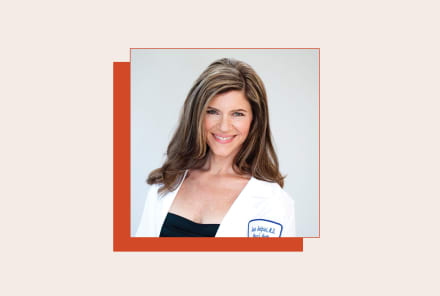Advertisement
A Women's Guide To Creatine Supplements: Benefits, Myths & Dosage Tips


Look up "creatine supplements" and you'll find giant tubs with macho fonts, clearly marketed toward the stereotypical gym bro. Historically, creatine has been sold to a primarily male audience focused on muscle gains and athletic performance, but there's compelling research to show that women could benefit from them too, for reasons that stretch beyond exercise.
Here, nutrition experts and a creatine researcher share the science-backed benefits of creatine for brain and cognitive health, heart and vascular health, healthy aging, and more.
The need-to-knows:
- Creatine is a well-studied supplement: Creatine has been studied for decades and has a strong safety profile. Very few side effects have been reported, and creatine is widely recognized as safe by numerous sports and health organizations.
- Creatine is not just for male athletes: Women have lower body stores of creatine than men. Supplementing with creatine can improve bone mineral density and has been shown to improve mood and cognition.
- Active women don''t need to load creatine: While some bodybuilders and athletes take loading doses of creatine to maximize short-term performance benefits, most women will see benefits from taking a dose of 3 to 5 grams daily.
What is creatine?
Creatine is a naturally occurring compound that helps the body produce energy in the form of adenosine triphosphate (ATP).
Creatine is well known for its performance-enhancing effects during high-intensity, short-duration activities such as sprinting and weightlifting, hence why it's such a popular supplement in the exercise space.
There are some food sources of creatine1, including herring (3.0 to 4.5 grams per pound), pork (2.3 grams per pound), beef (2 grams per pound), and salmon (2 grams per pound), but creatine supplements have also been around for decades.
Benefits for women
Here are six science-backed benefits of creatine for women:
It improves athletic performance
There is no denying the performance-enhancing effects of creatine2. Studies have consistently shown that creatine supplementation improves high-intensity exercise performance and training adaptations.
"Creatine can be very beneficial to women in increasing strength, power, and overall athletic performance," says dietitian nutritionist Abby Grimm, M.S., RDN.
It may help protect bones and muscles as women age
As females age, their estrogen levels decrease, resulting in skeletal muscle weakness3.
"Creatine assists in muscle maintenance, which is crucial for aging populations to prevent sarcopenia (age-related muscle loss)," says Louisa Nicola, a neurophysiologist and Momentous human performance adviser. "[Creatine] also potentially enhances bone density in combination with training, reducing the risk of osteoporosis, a significant concern for postmenopausal women."
Darren Candow, Ph.D., CSEP-CEP, a professor at the Aging Muscle and Bone Health Laboratory in the Faculty of Kinesiology and Health Studies at the University of Regina, notes that creatine has been shown to combat bone mineral density4 loss in combination with resistance training in the hip region in postmenopausal females4.
This is a growing area of interest for creatine researchers. "Additional research will investigate the effects of creatine on falls and fracture prevention in females, primarily postmenopausal females," shares Candow. "Further, a comparison of the effects of creatine in pre- vs. peri- vs. postmenopausal females is needed."
It may improve birth outcomes in pregnant women
An exciting growing area of research is how creatine may benefit birth outcomes. "Creatine supplementation during pregnancy5 has been shown to enhance neuronal cell uptake of creatine and support mitochondrial integrity to support brain health," says Grimm. "Reduced creatine levels in late pregnancy6 have also been associated with low fetal growth."
Of course, if you are pregnant, speak with your physician or a registered dietitian before using creatine (or any other supplement).
It may support brain and cognitive health
Supplementing with creatine may have benefits for improving cognitive processing7, brain function8, and even recovery from trauma in both men and women. "Studies have shown improved memory and cognitive function, especially when sleep is scarce," says Grimm.
Nicola explains that creatine supplementation has been shown to support brain health by enhancing memory and intelligence, especially in tasks requiring speed of processing.
Because creatine aids in maintaining energy levels in the brain, Nicola notes that it is now being implicated in neurodegenerative diseases such as Alzheimer's disease and Parkinson's9 in preclinical research.
"Studies suggest creatine can play a role in neurological health, potentially reducing the risk of neurodegenerative diseases," she says. "More investigation is needed on the long-term impact of creatine on cognitive health and its potential in preventing age-related cognitive decline."
It may have mental health benefits
Depression rates are two times higher in females than males10, with the highest depressive episodes correlated with increased hormonal phases such as puberty, menstrual cycle, pregnancy, and menopause.
Jenna Stangland, M.S., RDN, CCSD, co-founder of A4 Health and performance dietitian for the Minnesota Wild and Minnesota Timberwolves, explains there is a relationship between creatine metabolism in the brain and depression11.
"When there are smaller amounts of white matter creatine and phosphocreatine in the brain, more severe depressive episodes occur," she says. "Research reveals that creatine enhances cell health and survival. Creatine can be shown to impact mood12 by promoting brain energy levels. The frontal lobe controls mood, cognition, memory, and emotion; therefore, supplementing with creatine could positively impact those functions of the frontal lobe."
It may be cardio-protective
Creatine plays a key role in cardiovascular function as it's involved in heart contraction and energy production in heart cells. Because of this, supplementing with creatine may offer cardio-protective benefits.
"Creatine levels have been shown to be decreased in cardiac patients13. Thus, supplementing with creatine may be protective for women at risk for hereditary heart conditions," says Grimm.
What's next for creatine research?
How much do you need?
Wondering how much creatine to take at a time? It depends on your goals.
Candow notes that from a muscle health and performance perspective, 3-5 grams per day is adequate2 for most people.
You may have heard of a "loading phase" for creatine. Loading creatine involves taking 20 to 25 grams in divided doses for five to seven days to up your muscle's stores of the compound before moving on to a normal dose after that.
However, Grimm says the loading phase is not necessary. "If a woman is hoping to maximize the performance benefits of creatine in a very short period of time (less than 30 days), following a creatine 'loading' strategy may be helpful," she explains. "However, if a woman is planning to ingest creatine over an extended period of time (more than 30 days) and for a variety of benefits, she can avoid the loading phase and just follow the maintenance strategy of 5 grams a day."
If you're looking to take creatine for other goals, you may benefit from taking slightly more of it, but we need more research to be sure. "From a bone perspective, 8 grams or more per day has been shown to be effective (only when combined with weight training)," says Candow. "From a brain perspective, the small body of research suggests higher doses (i.e., 10-20 grams/day) or lower doses (4 grams or more) for several months are needed to accumulate in the brain."
Best practices for supplementing
If you're ready to start supplementing with creatine, here are a few tips from our experts on what to look for in a supplement and how to take it:
- Look for creatine monohydrate
- Choose a creatine supplement that is third-party tested, which ensures purity and potency
- Powdered forms are typically more convenient to consume gram amounts than pill forms of creatine and are more affordable
- Take creatine daily, even on non-exercise days
- Creatine can be taken at any time, but there may be more creatine uptake into your muscles if you take it post-workout. Taking creatine consistently is more important than timing.
- Always mix creatine with water or a beverage of choice, like a protein shake
- Creatine can be taken with or without food
- Make sure you stay hydrated when supplementing with creatine
Myths about creatine supplements
Despite decades of research, some myths about creatine persist. Let's bust a few of them:
"It causes water retention and weight gain"
One of the biggest deterrents women have about supplementing with creatine is the possibility of gaining weight or getting bloated. This one's both a myth and a fact. While you may experience temporary weight gain due to water retention, creatine does not cause fat gain.
"Weight gain is often caused by water retention, an effect of supplementing with creatine14, which causes bloating," says Stangland. "This has only been shown short term or in the first few days of a loading phase of creatine at 20 grams a day. After those first days, the total body water has not shown to increase as a result of creatine supplementation."
"Everyone needs to take a loading dose to get the full benefits"
Speaking of loading creatine, Stangland says it's not required by the average person to achieve improvements in muscle mass and performance. "Studies have revealed that intramuscular creatine levels were similar in patients loading versus consuming a regular dose (~5 grams a day)."
"It causes hair loss & acne"
"The hair loss myth originated from a study conducted in 200915, where rugby players experienced an increase in DHT [after creatine supplementation]," explains Stangland. "Changes in DHT levels have been linked to hair loss; however, these athletes already had lowered DHT levels, so the increase in DHT looks statistically significant. Furthermore, there was only an increase in DHT and not overall testosterone. No other studies have produced statistically significant increases in DHT or overall testosterone when consuming creatine."
Candow adds that the same is true for acne. "Both of these myths may stem from creatine being linked to serum DHT levels, but again, there's no direct evidence-based link."
"It's a 'man's supplement"
As for creatine being a "man's supplement," Grimm says that women can absolutely benefit from it too. "Women naturally have 70 to 80% lower creatine stores16 than men, and women typically consume significantly lower amounts of dietary creatine, which comes primarily from animal foods like beef, compared to men."
Safety & side effects
You've likely heard that creatine is one of the most researched supplements2 out there, but what exactly does that mean? Candow explains that "numerous studies have shown that the safety profile of creatine is excellent, with creatine not causing any greater adverse effects than placebo on measures of kidney, liver, or cardiovascular function."
Stangland adds that studies in both diseased and healthy populations with varying doses have revealed no adverse health effects. "You could theoretically take 30 grams a day for many years2 and be fine," she says. "There have been repeated findings that age, training level, and health in relation to creatine consumption did not produce any severe side effects."
While decades of research2 support creatine's safety, including in children and adolescents, individuals with kidney or liver disease and those who are pregnant or breastfeeding should consult with a health care provider before supplementing.
Arguments against supplemental creatine
Because of the continued misconceptions surrounding creatine, there are many health experts who believe that supplementing with creatine is unnecessary and that you can get adequate creatine from your diet.
While creatine is found in small amounts in foods like meat and fish, Nicola points out that the quantities are insufficient to achieve the levels used in studies. "Vegetarians and vegans can particularly benefit from supplementation, as their diets typically lack creatine-rich foods," she adds.
Many health experts don't recommend creatine for women with kidney disease, liver disease, or diabetes. However, Emily N. Werner, Ph.D., R.D., CSSD, a registered dietitian and exercise physiologist, previously told us that this myth has been dispelled by decades of research17 showing chronic creatine supplementation at recommended doses had no effect on kidney function.
"The only people we think 'may' not be able or at least should get medical approval to take creatine are those with preexisting kidney or liver abnormalities," says Candow. "However, even these individuals can still likely take creatine at a very low dose."
The mindbodygreen POV
Creatine has been marketed as a "man's supplement" for far too long. Active women can use creatine to improve their athletic performance, build lean muscle mass, and support their cognition (and they're naturally lower in it than men). Supplementing with creatine might be especially beneficial during particular periods of a woman's life, like pregnancy and menopause, based on emerging research.
It's a myth that creatine supplements cause weight gain, hair loss, and acne. In reality, creatine is one of the most extensively studied supplements on the market, and it's shown to have very few side effects. Most women won't need to take a loading dose of the supplement and can simply start by taking 3-5 grams daily at any time of day.
—Emma Loewe, mindbodygreen health & sustainability director
FAQ
Can creatine cause weight loss in women?
Not likely. Weight loss is achieved through a calorie deficit and other lifestyle factors. Creatine typically increases body mass through temporary water retention or lean muscle mass over time.
Can creatine help women over 40?
Yes, creatine may enhance bone density, and it can potentially reduce the risk of osteoporosis, which is a significant concern for postmenopausal women.
Does creatine cause acne?
No. There is no direct evidence showing that creatine causes acne.
The takeaway
Creatine is a safe and effective supplement for women, with decades of research to support its benefits. There is compelling evidence that a creatine intake of 3-5 grams per day may provide women with significant health benefits throughout their life span. Exciting new research shows many therapeutic and clinical applications of creatine beyond athletic performance, with more developments on the horizon. Watch this space.
17 Sources
- https://ods.od.nih.gov/factsheets/ExerciseAndAthleticPerformance-HealthProfessional/
- https://www.ncbi.nlm.nih.gov/pmc/articles/PMC5469049/
- https://www.sciencedirect.com/science/article/abs/pii/S8756328219301206?
- https://www.ncbi.nlm.nih.gov/pmc/articles/PMC7998865/
- https://www.ncbi.nlm.nih.gov/pmc/articles/PMC4007139/
- https://pubmed.ncbi.nlm.nih.gov/27550725/
- https://www.ncbi.nlm.nih.gov/pmc/articles/PMC6093191/
- https://www.ncbi.nlm.nih.gov/pmc/articles/PMC1691485/
- https://www.sciencedirect.com/science/article/abs/pii/S0955286324000196
- https://www.ncbi.nlm.nih.gov/pmc/articles/PMC4478054/
- https://www.ncbi.nlm.nih.gov/pmc/articles/PMC6769464/
- https://www.ncbi.nlm.nih.gov/pmc/articles/PMC7026167/
- https://www.ncbi.nlm.nih.gov/pmc/articles/PMC8067763/
- https://www.ncbi.nlm.nih.gov/pmc/articles/PMC7871530/
- https://pubmed.ncbi.nlm.nih.gov/19741313/
- https://pubmed.ncbi.nlm.nih.gov/33800439/
- https://www.tandfonline.com/doi/full/10.1186/s12970-021-00412-w
Watch Next
Enjoy some of our favorite clips from classes
Enjoy some of our favorite clips from classes
What Is Meditation?
Mindfulness/Spirituality | Light Watkins
Box Breathing
Mindfulness/Spirituality | Gwen Dittmar
What Breathwork Can Address
Mindfulness/Spirituality | Gwen Dittmar
The 8 Limbs of Yoga - What is Asana?
Yoga | Caley Alyssa
Two Standing Postures to Open Up Tight Hips
Yoga | Caley Alyssa
How Plants Can Optimize Athletic Performance
Nutrition | Rich Roll
What to Eat Before a Workout
Nutrition | Rich Roll
How Ayurveda Helps Us Navigate Modern Life
Nutrition | Sahara Rose
Messages About Love & Relationships
Love & Relationships | Esther Perel
Love Languages
Love & Relationships | Esther Perel

















